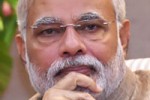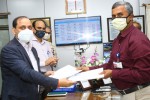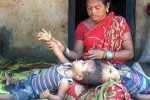Odisha Channel Bureau
Bhubaneswar: A meeting of the National Task Force (NTF) on COVID-19 was convened on Saturday by ICMR under co-chairpersonship of Vinod Paul, Member Niti Aayog and Balram Bhargava, Secretary, Department of Health Research & Director General ICMR.
The meeting was also attended by Randeep Guleria, Director, AIIMS; Director General Health Services (DGHS); Drug Controller General of India (DCGI); Director, National Center for Disease Control (NCDC); other representatives from Ministry of Health and ICMR as well as independent subject experts.

According to an official release, the Main objective of the NTF was to discuss evidence-based modifications in testing, treatment and surveillance strategies for SARS-CoV-2 in view of the recent reports of emergence of a new variant strain of the virus from UK.
The variant strain has 14 non-synonymous (amino acid altering) mutations, 6 synonymous (non-amino-acid altering), and 3 deletions. Eight mutations are present in the Spike (S) gene which carries the binding site (Receptor Binding Domain) of the ACE2 receptors, which are the point of entry of the virus into the human respiratory cells.
NTF deliberated in detail on aspects related to current National Treatment Protocol, testing strategy and surveillance of SARS-CoV-2 vis-à-vis the UK variant strain. It was emphasized that since the UK variant strain is implicated to cause increased transmissibility of the virus, it is critical to identify individuals infected with this strain and adequately contain them to prevent its transmission in India.
NTF concluded that there is no need to change the existing Treatment Protocol in view of mutations emerging in the strain. Further, since ICMR has always advocated use of two or more gene assays for testing SARS-CoV-2, it is unlikely to miss infected cases using the current testing strategy.
NTF recommended that in addition to the existing surveillance strategies, it is critical to conduct enhanced genomic surveillance for SARS-CoV-2 specially in incoming passengers from UK. Besides, it will also be critical to conduct genome sequencing in samples where there is dropout of the S gene in lab diagnosis, proven cases of re-infections etc. Routine genomic surveillance of SARS-CoV-2 from representative samples all across the samples needs to be a continuous and well-planned activity.
NCDC informed that Government of India has taken cognizance of the reports of mutant variant of SARS-CoV-2 reported from UK and the response of other Countries to these reports. The situation is being monitored proactively. A strategy has been put under place to detect & contain the mutant variant.
The salient features of the strategy are:
A. At points of entry (All International Airports in India):
* All passengers who had arrived from UK between 21st December – 23rd December 2020 have been tested at the Airports
* Only after the RT-PCR test result are available, the negative passengers are permitted to exit the airports
* All positively tested passengers are put under institutional isolation and their samples sent for Whole Genome Sequencing (WGS)
* Only after the confirmation of the non-mutant variant upon WGS result, the positive cases are permitted to leave institutional isolation as per the existing management protocol
* All the contacts of the positive cases are also put under facility quarantine and are tested as per the ICMR guidelines
B. Community Surveillance:
* List of all UK arrivals during the last 28 days has been shared by Bureau of Immigration with the concerned States
* All passengers who had arrived from UK between 25th November – 20th December 2020 are being tracked by the IDSP State Surveillance Units (SSUs) and District Surveillance Units (DSUs)
* Testing as per the ICMR guidelines of these passengers is being pursued and all positive cases are put under mandatory facility isolation
* Samples of all positive cases are being sent for WGS
* Enhanced contact tracing of these positive cases is being undertaken and these contacts are also put under facility quarantine
* Discharge of positive cases only after ensuring two samples testing negative after 14 days
C. Prospective surveillance:
* 5% of the positive cases from all States/UTs will be tested for WGS
* A genomic surveillance consortium, INSACOG, has been formed under the leadership of NCDC, New Delhi for laboratory and epidemiological surveillance of circulating strains of SARS-CoV-2 in the Country.Further, more than 50 samples of UK returnees are currently under sequencing at the designated laboratories. Other laboratories in the consortium are: National Centre for Disease Control, Delhi; CSIR-Institute of Genomics and Integrative Biology, Delhi; CSIR- Centre for Cellular and Molecular Biology, Hyderabad; DBT- Institute of Life Sciences, Bhubaneshwar; DBT-National Institute of Biomedical Genomics, Kalyani; DBT-InStem-National Centre for Biological Sciences, Bengaluru; National Institute of Mental Health & Neurosciences (NIMHANS), Bengaluru; ICMR- National Institute of Virology, Pune.
It is proposed to continue enhanced genomic surveillance for early detection and containment of the UK variant SARS-CoV-2 strains. However, it is important to understand that like all other RNA viruses, SARS-CoV-2 will continue to mutate. The mutated virus can also be contained by measures like social distancing, hand hygiene, wearing masks and also by an effective vaccine, as and when available.















